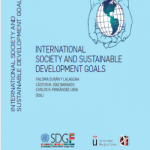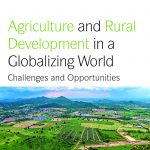Research Area: Agriculture Transformation, Food Systems & Nutrition Transition

Getting to zero hunger: Learning from the MDGs for the SDGs
In International Society and Sustainable Development Goals, Chapter 5. Portada: Thomson Reuters. ARANZADI.

Agriculture and Rural Development in a Globalizing World
Abstract This introduction presents an overview of the key concepts discussed in the subsequent chapters of this book. The book analyzes farm-level data from four low-income sub-Saharan African countries to gain insight into possible reasons for the low adoption of modern productivity-enhancing inputs, such as...

Understanding the Multidimensional Nature of the Malnutrition Problem in India
Abstract India’s slow progress in combating its malnutrition problem was highlighted most starkly when a comparison between its rates of poverty and malnutrition decline between the mid-1990s and mid-2000s was brought to the fore, with the release of the National Family Health Survey in 2005....

Unraveling India’s Malnutrition Dilemma – a Path Toward Nutrition-sensitive Agriculture
Abstract This chapter makes the case for India to shift to a nutrition-focused agricultural sector that goes beyond staple grain productivity to emphasize the production and consumption of micronutrient-rich foods. The chapter first reviews the nutrition trends in India, characterized by slow progress in addressing...

The Green Revolution and Crop Biodiversity
Abstract Crop diversity in the fields of the developing world has changed fundamentally over the past 200 years with the intensification and commercialisation of agriculture. This process accelerated with the advent of the Green Revolution (GR) in the 1960s when public sector researchers and donors...

Transforming Smallholder Agriculture to Achieve the SDGs
Abstract There is overwhelming historical evidence from the developed world and from the newly emerging economies of the developing world that indicates that agricultural growth has been the primary engine of overall economic growth. The transformation of economies around the world, from predominantly agricultural to...

Toward an Integrated Approach to Nutritional Quality, Environmental Sustainability, and Economic Viability: Research and Measurement Gaps
Abstract Nutrition is affected by numerous environmental and societal causes. This paper starts with a simple framework based on three domains: nutritional quality, economic viability, and environmental sustainability, and calls for an integrated approach in research to simultaneously account for all three. It highlights limitations...

Wringing Food from the World
Read the article

Agricultural Policy and Nutrition Outcomes – Getting Beyond the Preoccupation with Staple Grains
Abstract There is a growing disconnect between agricultural policy and contemporary nutritional challenges, the persistent problem of micronutrient malnutrition and child stunting, as well as the emerging challenges of overweight and obesity. Diversification of production systems and the market supply of enhanced diversity will only...

Book Review: The Evolving Sphere of Food Security
Read the article

